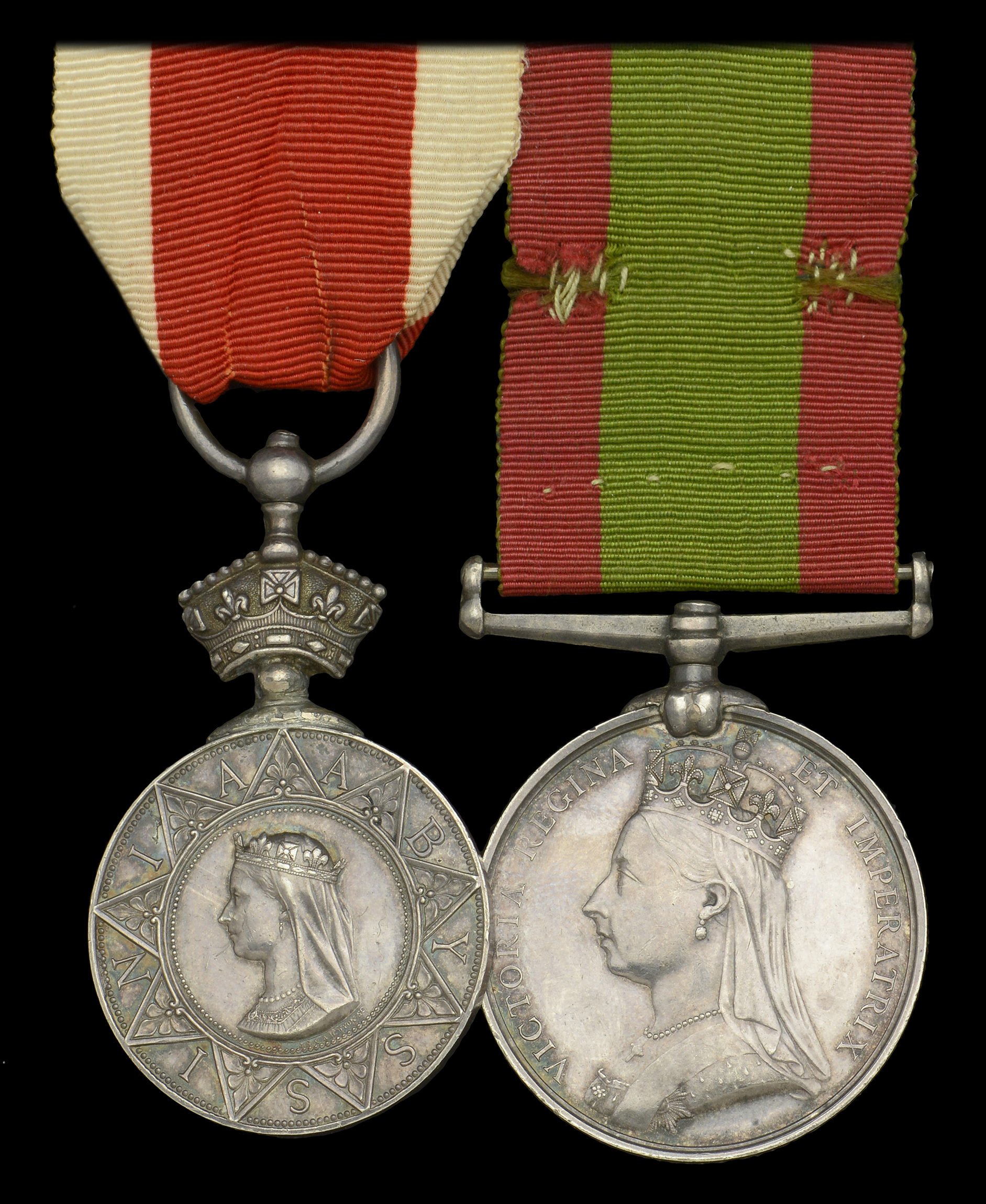Pair: Colonel A. W. Macnaghten, 2nd Bombay Light Cavalry, Indian Army, who during the Abyssinia campaign received the unusual combination of both a ‘Mention’ and a reprimand from the General Officer Commanding, the latter for taking his whip to an insubordinate officer Abyssinia 1867 (Captn. A. W. Macnaghten 2nd. Bombay Light Cavry.) suspension repaired; Afghanistan 1878-80, no clasp (Lt. Col. A. W. Macnaghten. 2nd. Bo. Lt. Cavy.) mounted as worn, good very fine (2) £1,000-£1,400 --- Provenance: Dix Noonan Webb, September 2004. Arthur William MacNaghten was born in Calcutta in June 1835, the son of a Bengal civil servant. Following a private education under the watchful eye of assorted clergymen, he attended the East India College Haileybury and was nominated for a Cadetship in the Bombay Cavalry by a kinsman - and Director of the East India Company - Eliot MacNaghten. On arrival at Bombay in April 1854, MacNaghten joined the 2nd Light Cavalry, by whom, in December 1856, he was reported as being a ‘very promising young officer, the most likely to do justice to the Adjutancy’. He was duly advanced to Lieutenant in October of the following year, and went on to serve in various Field Columns in Central India 1858-59, in pursuit of Tantia Tope and other rebels, but did not qualify for entitlement to the Medal, his name having been struck off the roll as ‘Not entitled’ (accompanying copy roll entry refers). MacNaghten did get his Adjutancy, however, joining the Poona Horse in that capacity in February 1861, and was also advanced to Captain in January of the following year. Better still, he served as an Aide-de-Camp to Major-General Smith at Poona and Karachi between May 1862 and August 1864, but was compelled to return home on furlough on a medical certificate in the latter month. Soon after his return to India in early 1867, MacNaghten was attached to the 3rd Bombay Light Cavalry and embarked for Abyssinia, where he served throughout the expedition and was present at the capture of Magdala, being Mentioned in Despatches by General Napier for his part in commanding the 180-strong contingent of his regiment at the final investment of that place, when, in a force commanded by Colonel Graves, it moved up to ‘the Kaffir Burr Gate, which was watched by the Gallas’ (London Gazette 16 June 1868 refers). Less happily, perhaps, he also came to the C.-in-C’s attention for having taken his whip to an insubordinate officer, Captain C. L. Halbert, who was on attachment to his regiment. MacNaghten had already confined Halbert to his tent for ‘disobeying a lawful command’, but, as described in the proceedings of a subsequent Court Martial, he then took it upon himself to deliver his own punishment:
‘For conduct unbecoming the character of an Officer and a Gentleman, in having, on or about the Eighth day of November, one thousand eight hundred and sixty-seven, at camp Adooda, in Abyssinia, entered the tent of Lieutenant C. L. Halbert, of the same Corps, then in arrest, and violently assaulted the said Lieutenant Halbert by repeatedly striking him with a whip.’ Duly found guilty of the above stated charge, the court wisely elected to sentence MacNaghten to ‘be reprimanded in such manner as His Excellency the Commander-in-Chief may deem proper’, and the latter - no doubt experienced in the ways of officers and gentlemen - reacted by having MacNaghten ‘released from arrest and returned to duty’, adding in the same breath that his offence, ‘deliberately committed, deserved a severe sentence.’ Undoubtedly, though, his actions would have become a major topic of conversation on the regiment’s return to India, and MacNaghten’s next appointment, that of Superintendent of the Great Indian Peninsular Railway Police 1869-71, no doubt served as a suitable “cooling off” period! Given the Brevet of Major in December 1872, following a period of furlough back home, MacNaghten rejoined his old regiment, the 2nd Bombay Light Cavalry, as a 2nd Squadron Officer in the following year and, in August 1875, on advancement to substantive Major, was appointed 2nd in Command. Further promotion followed, and by the outbreak of the Second Afghan War he was a Lieutenant-Colonel commanding the regiment:
‘During the spring and early summer of 1880, the 2nd Bombay Light Cavalry served at Jacobabad, Quetta and Sibi, in the Reserve Division of the Kandahar Field Force ... [but] ... on the forward concentration of the troops in August 1880, in consequence of the disaster at Maiwand, the regiment was moved up to Kila Abdulla, and as a unit of General Phayre’s relieving force took part in the advance on Kandahar. The regiment remained serving in the neighbourhood of Kandahar and on the line of communication till after the evacuation of that city by the British forces’ (Shadbolt refers). MacNaghten became a full Colonel in March 1884, returned home of furlough in December 1890 and was placed on the Unemployed Supernumerary List in May 1892. He died at his residence in London in October 1919, and was interred in Brompton Cemetery, West Kensington. Sold with copied research.





